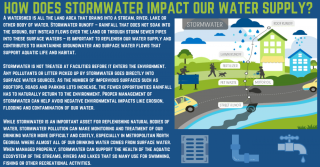Restoring Rain’s Reputation: What Everyone Can Do To Help

Properly dispose of hazardous substances such as used oil, cleaning supplies, and paint--never pour them down any part of your storm system and report anyone who does. Rain by nature is important for replenishing drinking water, supplies, recreation, and healthy wildlife habitats. It only becomes a problem when pollutants from our activities like car maintenance, lawn care, and dog walking are left on the ground for rain to wash away. Here are some of the most important ways to prevent storm water pollution:
- Store materials that could pollute storm water indoors and use containers for outdoor storage that do not rust or leak to eliminate exposure of materials to storm water.
- Use pesticides, fertilizers, and herbicides properly and efficiently to prevent excess runoff.
- Look for signs of soil and other pollutants, such as debris and chemicals, leaving construction sites in storm water runoff or tracked into roads by construction vehicles. Report poorly managed construction sites that could impact storm water runoff to the community.
- Install innovative storm water practices on residential properly, such as rain barrels or rain gardens, that capture storm water and keep it on site instead of letting it drain away into the storm sewer system.
- Report any discharges from storm water outfalls during times of dry weather--a sign that there could be a problem with the storm sewer system.
- Pick up after pets and dispose of their waste properly. No matter where pets make a mess--in a backyard or at the park--storm water runoff can carry pet waste from the land to the storm sewer system to a steam.
| Attachment | Size |
|---|---|
| 433.09 KB |

